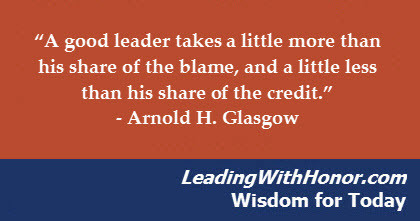Lee Ellis's Blog, page 268
July 20, 2016
The DNA of Telling the Truth Even When It’s Difficult
Unlike the torturous battles our leaders faced in the Vietnam POW camps*, most of the battles we face as leaders aren’t physically painful. But the emotional and mental battles to get results may seem equally challenging. Want to know the guiding force that kept my comrades and me unified while the enemy was trying to systematically divide and disable us?
It was the bond brought by our efforts to live up to the Military Code of Conduct, six articles articulated on a single page. Though most of us had memorized this code in our early training, we couldn’t have imagined what a critical role it would later play in our daily lives. When we faced the cruelty of isolation, hunger, torture, and constant threats, this code was a powerful reminder to choose the harder right and serve with honor.
Over the years, I’ve created my personal honor code—a set of articles that helps guide my life and work. Article 1 of my Honor Code is
“Tell the truth even when it’s difficult. Avoid duplicity and deceitful behavior.” [Tweet This]
In its basic form, truth is foundational for science and law. Every day, my consulting organization uses the science of behavioral assessments to determine natural behavior. In less structured day-to-day interactions such as communication, relationships, business development, and others, we know that an absence of truth and common values can lead to confusion, ambiguity, and ultimately poor results.
Most people grow as adults wanting to be known as honorable and trustworthy, even though ironically we naturally learn to lie as young “innocent” children without being taught. After leading and managing people for more than 40 years, I can assure you that lying or misrepresenting the facts is always right beneath the surface. Usually it’s fear or pride that makes it raise its ugly head. Having an awareness of this short list of common “lie generators” will help us build good character into our personal and professional DNA –
Fear of Negative Consequences. Consider the many headlines of politicians, businessmen, religious leaders, doctors, lawyers, judges, teachers, coaches, pro athletes, media personalities and literally every role in society that lie when caught in a transgression.
Fear of Not Looking Good or Good Enough. Insecure people will lie to enhance or protect their image. There has been a lot of talk about this issue in the media recently, but the tendency to stretch or shade the truth is a commonly used protective strategy. The root issue is pride.
Fear of Losing. Using lies to promote oneself and smear others has become an accepted tactic in many areas of our society—especially politics. Where is the honor?
Ideological Spin. This problem uses a half-truth or lie to advance a cause. Our communist captors boldly declared that, “Truth is that which most benefits the party.” And on that basis, they routinely tortured POWs to sign false propaganda lies.
I’m sure you can think of many other situations where truth is trampled for expediency, but truth is resilient and eventually we reap what we sow.
Regardless of the daily opportunities to misrepresent the truth or lie, we must all remain vigilant and choose the truth to get the best results for us, our teams and our society. [Tweet This]
Here are four things you can do to master Article 1 of the Honor Code –
Understand your own behavioral strengths and struggles. Know where you’re vulnerable.
Set the example by telling the truth even when it’s hard.
Talk to others about why the truth is so critical to trust and organizational effectiveness.
Bring out the truth to expose those who are telling lies.
Download a free copy of The Honor Code on my website at www.LeadingWithHonor.com.
LE
*As a young lieutenant, Lee Ellis was shot down while flying a mission in the Vietnam War and was a POW for over five years. You can read more about his story on his publishing website, FreedomStar Media.
30 Years of Behavioral Research and Development
Based on more than 30 years of research and experience in developing leaders, Leadership Behavior DNA™, led by leadership consultant and trainer Lee Ellis, focuses on some of the key behavioral issues of leadership and will help you understand what you do well and highlight areas where more leadership development is needed. Download a sample free report at www.LeadershipBehaviorDNA.com.


July 19, 2016
Why is Leadership Clarity So Hard? Here are the 5 Challenges
 Leadership Clarity is difficult because we’re dealing with humans—not machines. To understand the battle, here 5 barriers that we must overcome:
Leadership Clarity is difficult because we’re dealing with humans—not machines. To understand the battle, here 5 barriers that we must overcome:
Low Priority. We’re too busy and don’t recognize how important clarity is and just neglect it.
Bad Assumptions. We assume that others see the world that we’re seeing and therefore don’t understand that they don’t have the right picture.
Unfocused. Some leaders don’t take the time to focus and decide what they want to happen—what success will look like.
Lazy. Sometimes leaders are too lax in their approach, figuring that somehow it will get done. They think that they can give a few instructions, withdraw from the process, and then one day it will all be completed.
Fear. Some leaders resist clarity because they fear the responsibility of holding others accountable—which, at times, means being firm and risking “negative emotions.”
Yes, it’s a battle, but gaining clarity is worth fighting for. It reduces the fog and ambiguity that undermine high performance. It brings understanding, alignment, and positive energy. It opens the door for synergy and teamwork. Clarity is really a 360 degree challenge!
Read the entire on this topic, and please share your comments.


July 18, 2016
Your Best Source of Wisdom for Fall Leadership Planning – Preorder Your Copy
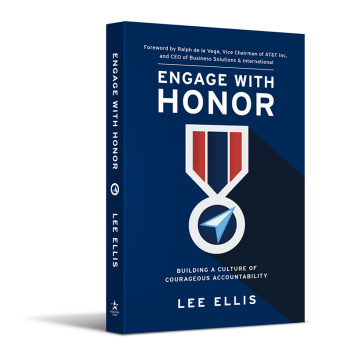 Hey Lee Ellis Fans – we believe that his new book, Engage with Honor, will provide the best source of leadership wisdom as you fulfill your goals during the Fall 2016 season. It’s being released on September 7th, but you can preorder now!
Hey Lee Ellis Fans – we believe that his new book, Engage with Honor, will provide the best source of leadership wisdom as you fulfill your goals during the Fall 2016 season. It’s being released on September 7th, but you can preorder now!
Visit the Amazon page or your favorite retailer—orders will ship that day. And, please share with anyone else that may be interested – thank you for your enthusiastic support!
Purchase on Amazon
Download a Sample Chapter
Watch the Trailer
From the Book’s Foreword –
“I’ve had the pleasure of working with Lee in his civilian life as a leadership consultant and have admired the way he uses those experiences to help executives develop their own leadership models. He and I share a passion for doing business the honorable way and for developing leaders who will embody the character and the values that will help lead their organizations with the highest integrity…in this new book, Lee expands the concept of honor in leadership and introduces the model to build a culture of Courageous Accountability…”
– Ralph de la Vega, Vice Chairman of AT&T Inc. and CEO of AT&T Business Solutions and AT&T International


On This Day in Leadership History for July 17, 2016
On this day in leadership history in 1941, Brigadier General Soervell directed Architect G. Edwin Bergstrom to have basic plans and architectural perspectives for an office building that could house 40,000 War Department employees on his desk by the following Monday morning. The building became known as the Pentagon. What’s the leadership lesson? Honorable leaders may have the vision, but you must rely and trust on the expertise of others to get results.
The Pentagon – Wikipedia


July 16, 2016
Leading with Honor Assessment – Take Your Free Snapshot Report
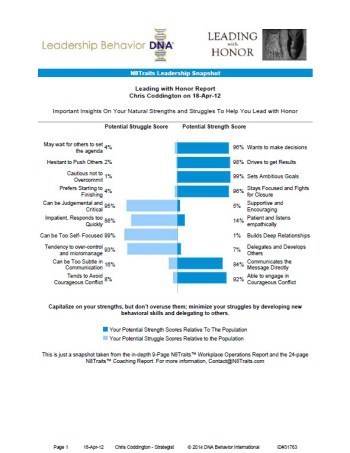 Are you tied to old ways of getting things done, or open to new ideas? Are you a bit too self-focused, or more outward-focused? What about your tendency to set goals?
Are you tied to old ways of getting things done, or open to new ideas? Are you a bit too self-focused, or more outward-focused? What about your tendency to set goals?
Try the free Leading with Honor Assessment for a snapshot of your natural leadership strengths and struggles! It’s complimentary for our fans and followers – Get Started on our website.


July 15, 2016
Leading with Honor Wisdom for Today, July 15, 2016
“A good leader takes a little more than his share of the blame, and a little less than his share of the credit.” – Arnold H. Glasgow


July 14, 2016
Fill in the Blank – “For leaders that must help solve racial division issues, the best principles to use are _______________________.”
Fill in the Blank – “For leaders that must help solve racial division issues, the best principles to use are _______________________.”
Please share your answers in this posts – thank you!


July 13, 2016
5 Reasons People Love a Good Story
How are certain employees able to energize their colleagues and elicit enthusiastic participation, while others deflate the room? It is the energy they create by telling a story through their work. Storytelling in business conveys information in a stimulating manner and makes it memorable…
Read ‘5 Reasons People Love a Good Story’, and share your thoughts…thank you!


July 11, 2016
Download a Free Sample of Engage with Honor
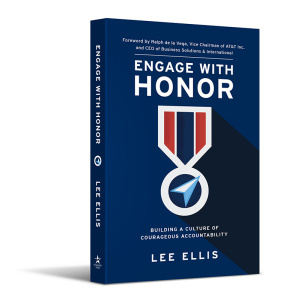 Want a free sneak peek at Lee’s new book, Engage with Honor?
Want a free sneak peek at Lee’s new book, Engage with Honor?
Download a sample, and please share with others – thank you!


July 10, 2016
On This Day in Leadership History for July 10, 2016
On this day in leadership history in 1985, Coca-Cola resumed selling the old formula of Coke, it was renamed “Coca-Cola Classic.” It was also announced that they would continue to sell “New” Coke.
What’s the leadership lesson? Don’t allow fear to try new things even if there’s some risk of failure. After calculating the risk and the strategic reasons for doing it, give it a try and see if it’s the spark of innovation that you need in your work!
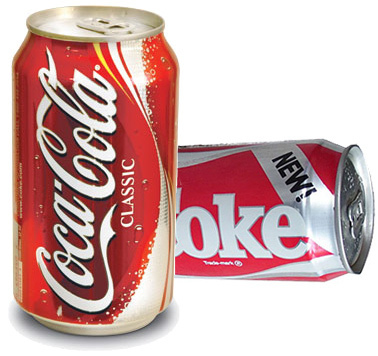 New Coke – Wikipedia
New Coke – Wikipedia





